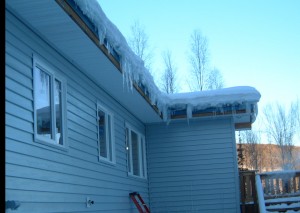After a snowy December, Fairbanks has received a respectable (though still below-average) 30 inches of snow so far this winter.
Which makes some residents start pondering snow loads.
Snow loads vary across Alaska, depending on where you live. For example, winter snow loads can range from up to 300 pounds per square foot (psf) in Whittier down to 25 pounds in northern Alaska. Many factors affect snow load, including the moisture content of the snow, seasonal accumulation and drifting.
The weight of snow depends on its moisture content, which will vary depending on the conditions. The moisture content of snow ranges from about 1 percent to about 33 percent (water weighs about 62 per cubic foot). Compressed snow, and even snow that simply accumulates over time, will be heavier than fresh snow.
Fallen snow can also pick up humidity from the air and increase in weight.
You determine weight by using a measurement called snow water equivalent (converting inches of snow into inches of water by taking a cylindrical core sample of snow and melting it). You can find the daily SWE for different locations in the state, including Fairbanks, at the USDA Natural Resources Conservation Services website at www.wcc.nrcs.usda.gov/snotel/Alaska/alaska.html. On Wednesday, for example, the snow depth was 16 inches and the SWE was 2.4 inches. To calculate pounds per square foot, you multiply the SWE by a conversion factor of 5.2 (check out the formula here: www.ak.nrcs.usda.gov/snow/data).
That gives you a snow load of roughly 12.5 psf. Keep in mind that this number is designed only to provide an estimate for the region.
Building code in the city of Fairbanks calls for roofs to withstand a minimum of 50 psf, but homes built before 1991 were required to carry 40 psf and older homes even less. Mobile homes can be built to carry just 20 psf.
But keep in mind there is no building code outside of the city limits. Roof snow loads can vary depending upon type of roof, roof slope, melting and re-freezing of snow and ice, among other factors. Sloped roofs that periodically shed snow load present benefits and risks. If snow slides safely onto open ground, there’s no problem.
But if that snow hits a deck on the way down, its force is multiplied many times more than its resting weight and can shear otherwise stable structures right off if they are not supported sufficiently. Or if snow slides onto a flat roof or other surface, its cumulative weight is magnified from than that of normal snowfall. Structures should be designed with overhangs or other features to offer sliding snow a safe path to the ground. The ability of chimneys or utility poles to withstand sliding snow should also be considered.
In addition, decks, sheds, greenhouses, campers and other structures built without permits or an inspection may not be able to handle much if any load depending on the quality of the workmanship.
An underbuilt roof structure may also be at risk for collapse from imbalanced loading.
How do you know if you have a problem? Well, if you’re not privy to the design specifications of your home, the safest route is to hire a structural engineer to inspect your home and do the math. An inspection can also reveal potential weak spots or places where your roof structure, deck, or framing might fail. Consider how additions or modifications might affect your home’s ability to support snow. Wood tends to be very flexible and can withstand a lot of force over time before it snaps. But eventually, if it is not built to the task, it can fail.
Clearing excess snow off your roof or deck is not usually necessary unless you are dealing with an older home, structures that are built to dubious specifications, or an extraordinary buildup of heavy snow. Clearing snow comes with its own risks — like falling off your roof.
Also, the addition of your own weight on an already stressed roof can make matters worse. If you suspect a roof might collapse (you witness sagging or hear creaking), get down immediately.
